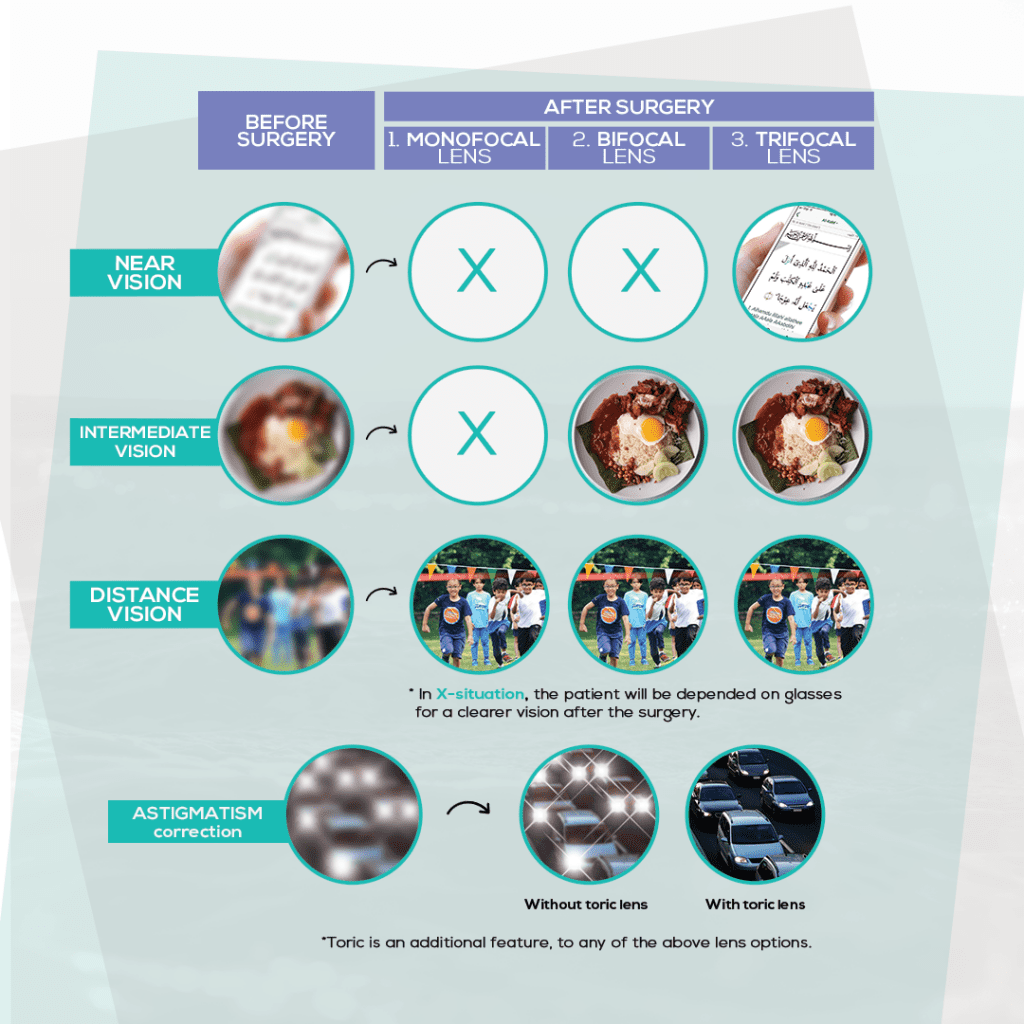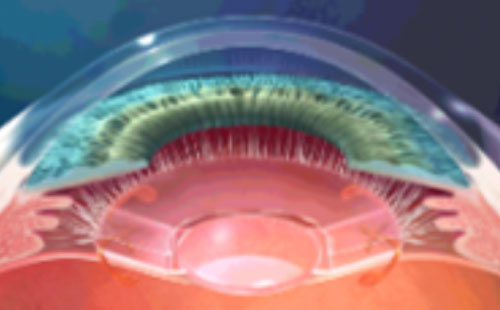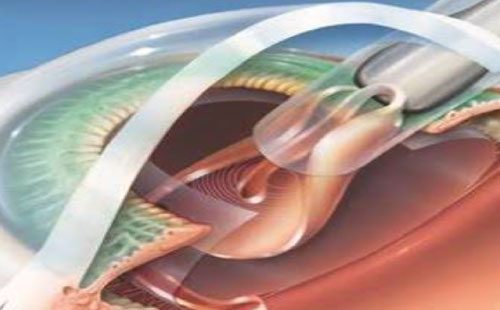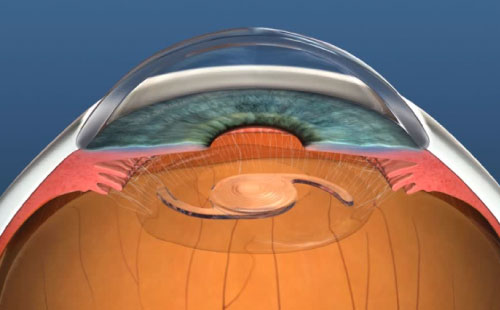Cataract Surgery
Introduction To Cataract Treatment
"Your eye is like a camera. It requires a clear lens to focus and produce a good image. But when the lens gets dirty or cloudy, the camera cannot take a good clear picture"
What is cataract?
“Your eye is like a camera. It requires a clear lens to focus and produce a good image. But when the lens gets dirty or cloudy, the camera cannot take a good clear picture.”
Cataract is due to clouding of the clear natural lens that blocks the light from passing through the eye, resulting in a poor quality vision. Cataract is the most common cause of decreased vision among people over the age of 60 years old.



What are the types of Intraocular Lens (IOL) available at IKONIK?



When should I check my eyes for cataract?
Ideally, when you experience blurring of vision or reduction of your visual performance, you should get your eyes checked as this may be an early symptom of cataract.
Can patients gain their sights back by wearing glasses?
Glasses can temporarily help in patients with some types of mild cataract. Eventually, cataract surgery is still the definite way to treat it.
Cataract Surgery Procedure



Step 1
A small incision is made at the peripheral cornea



Step 2
Removal of the natural lens



Step 3
An IOL is inserted. The incision is closed and adhered without using stitches
Pre-operative Consultation:
Meet with your ophthalmologist to assess the severity of your cataract, discuss lens options, and address any concerns or questions.
Anesthesia:
Before the surgery, you will receive local anesthesia to numb the eye, ensuring a painless procedure. Usually, the local anaesthetia used are in the form of eye drops; no injections involved.
Incision:
Your surgeon will create a small incision in the cornea, through which the cataract-affected lens will be accessed.
Lens Removal:
The clouded natural lens is carefully fragmented and removed using either phacoemulsification (ultrasound) or extracapsular extraction (manual removal).
Lens Replacement:
An artificial intraocular lens (IOL) is inserted into the lens capsule to replace the removed cataract lens, providing clear vision.
Incision Closure:
The incision is typically self-sealing and does not require sutures.
Benefits of Cataract Treatment
- Significant lifestyle improvement
- Better quality of life
- Reduction in risk of injuries and accidents related to poor vision
FAQ on Cataract Treatment
How long do I have to wait to get my surgery performed after my assessment with an eye specialist?
If you are fit for the surgery and the slot is available, you can undergo the surgery as soon as possible. This also means that your surgery can be done on the same day if there are available slots.
In some cases, the artificial lens must be customized and specially ordered abroad. Hence, it may take up to 6 weeks for the lens to reach our centre and we will schedule your surgery immediately.
Should I fast during the surgery day?
You do not have to fast before your surgery and please take your regular medications before the surgery, especially for diabetic and hypertensive patients. We only proceed with the surgery if the sugar and blood pressure level are within the normal range to ensure the safety of your eyes.
Do I need to bring my sunglasses during the surgery day?
It is not mandatory; it depends on the patient. However, sunglasses may help with the patient’s comfort level after the surgery as some patients may experience glare.
Do I need to avoid consuming any specific food after the surgery?
You can continue your usual dietary intake, however, please avoid food that you’re allergic to. For diabetics, you are advised to take food that keeps your sugar level within the normal range.
Can I do my daily activities after the surgery such as cooking, using gadgets, computers, etc.?
Yes, you can continue your daily normal activities. However, refrain from heavy lifting or bowing. You’re not encouraged to do so in the first week after the surgery as the newly implanted artificial lens is not yet stable.
Can I take ablution and pray (solat) as usual?
Indeed, you can continue your ablution and prayers daily. You are advised to close your eyelids while washing your face – the most important thing is that you do not rub your eyes vigorously. For prayers, you can start to prostrate in your solat after 24 hours of the surgery. However, specific instructions will be given you to by your surgeon after the surgery.
Do I need to use an eye shield after the surgery?
It is compulsory to put on the eye shield to protect your eyes during the first week, especially while sleeping to avoid any injury that might occur from the unconscious rubbing of your eyes during sleep. However, during the daytime, you can protect your eyes by wearing your sunglasses.
How long does the healing process take?
The healing process depends on individuals, however, in most cases, it takes one week for the surgical wound to close. In terms of vision, the patient will see improvement after 1-2 days following surgery.
What are the steps I should take to take care of my eyes after the surgery?
It would be best if you refrained from rubbing, scratching, or putting pressure on the eyes. Adhere strictly to the dos and don’ts post-operation.
Can I take the shower after the surgery?
Yes, absolutely! Hygiene is very important to avoid infection. While washing your hair, close your eyes to avoid water from entering your eyes. Wipe your face gentlly with a clean towel.
Can I travel by plane immediately after the surgery?
After your surgery, you can travel by flight, and please ensure that you instill your post-op eyedrops accordingly.
When do I have to come for the follow-up appointments?
Usually, patients are advised to go for the first follow-up appointment one week after the operation date. While the second follow-up appointment is after six to eight weeks from the first follow-up, however, in remote instances, whereby your eyes showed signs of infections such as redness, discharge, swollen eyes, and decreased vision, please do come instantly and if we are closed, please go to the nearby hospitals or clinics.
Book Now
Book Your Appointment
Working Hours:
8:30am – 5:30pm (Monday – Saturday)
Contact Us:
9,10,11, Residensi Park Bukit Jalil, Persiaran Jalil Utama, 57000, Bukit Jalil, Kuala Lumpur

